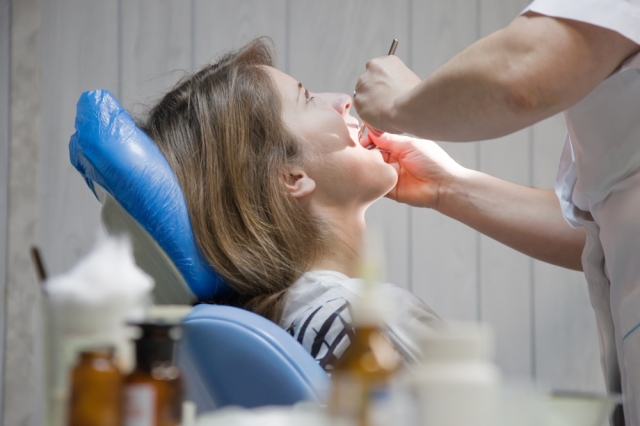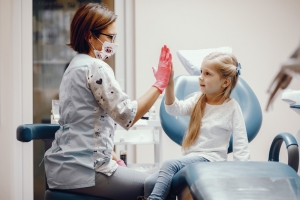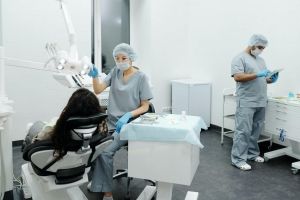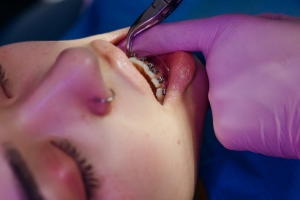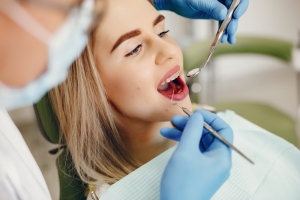Have you ever felt a clicking or popping sound every time you open your mouth to eat or talk? It might seem like a minor inconvenience, but your jaw could be signaling a deeper issue. Persistent jaw sounds are often linked to temporomandibular joint (TMJ) disorders, which can cause discomfort and long-term oral health problems if left untreated.
In this guide, we will explore why jaw clicking or popping happens and what it could mean for your overall dental health. We will also discuss how advanced dental solutions, such as those offered by leading All-on-4 Houston specialists, can help restore proper jaw function and protect your smile for years to come.
Understanding the Temporomandibular Joint (TMJ)
The TMJ is one of the most complex joints in the human body. It connects your jawbone to your skull, allowing you to talk, chew, and yawn smoothly. When this joint functions properly, you barely notice it. But when something disrupts its movement, it can cause pain, stiffness, or clicking sounds.
Dentists describe the TMJ as a sliding hinge mechanism cushioned by cartilage and a small disc. When that disc shifts out of position or becomes worn, it creates friction, leading to the familiar “pop” or “click.”
Common Causes of Jaw Clicking and Popping
Jaw clicking does not appear out of nowhere. It often results from one or more of the following conditions:
a. Teeth Grinding (Bruxism)
Habitual grinding or clenching puts immense pressure on the jaw joint. Over time, it causes muscle fatigue and inflammation, which leads to clicking or popping.
b. Misaligned Bite
If your upper and lower teeth do not fit together properly, your TMJ must work harder to move your jaw, eventually leading to dysfunction.
c. Arthritis
Osteoarthritis or rheumatoid arthritis can damage the cartilage that cushions your jaw joint, producing clicking noises with movement.
d. Injury or Trauma
An accident or a blow to the jaw can dislocate or strain the TMJ, causing ongoing discomfort and irregular sounds.
e. Stress and Muscle Tension
Chronic stress leads to jaw clenching, which overworks the muscles surrounding the TMJ and contributes to popping sounds.
Warning Signs You Should Not Ignore
Many people experience occasional jaw sounds without pain. However, when clicking is accompanied by these symptoms, it warrants professional evaluation:
- Persistent pain or tenderness near the ear or jaw
- Difficulty opening or closing your mouth completely
- Frequent headaches or facial pain
- Swelling around the jaw joint
- Locking or stiffness when eating or talking
Ignoring these red flags may lead to severe joint damage and long-term complications such as chronic TMJ disorder.
How Jaw Clicking Affects Oral Health
Even minor jaw issues can gradually impact your oral health. TMJ problems often lead to uneven wear on teeth, gum recession, and muscle imbalance. The strain on surrounding tissues can also trigger headaches, neck stiffness, and sleep disturbances.
If left untreated, the condition can progress and require complex restorative solutions such as bite realignment or full-arch reconstruction.
Diagnostic Process: Finding the Root Cause
When you visit a dental expert, diagnosis begins with a comprehensive TMJ evaluation. This may include:
- Physical examination of your jaw’s movement
- Digital X-rays or 3D imaging for joint assessment
- Review of your bite alignment and muscle function
- Discussion of lifestyle habits and stress levels
Effective Treatment Options for Jaw Clicking
Treatment varies depending on the cause and severity of your TMJ condition. Common options include:
Custom Night Guards
If grinding is the culprit, custom-fitted night guards protect your teeth and reduce jaw tension while you sleep.
Bite Adjustment or Orthodontic Treatment
Correcting bite misalignment can relieve pressure on the TMJ, restoring balance and comfort.
Physical Therapy and Exercises
Jaw exercises, massage, and stretching can strengthen muscles and enhance joint mobility.
Medication and Injections
Anti-inflammatory medication or targeted injections can alleviate pain and reduce inflammation.
e. Advanced Restorative Procedures
In cases of severe TMJ deterioration, dental restorations such as crowns, bridges, or even All-on-4 dental implants may be required to re-establish proper bite alignment and joint support.
Lifestyle and Home Remedies for Jaw Relief
You can ease minor symptoms at home with lifestyle changes and self-care strategies:
- Avoid chewing gum or eating tough foods.
- Apply warm compresses to relax muscles.
- Practice good posture to relieve neck and jaw strain.
- Manage stress through meditation, yoga, or breathing exercises.
- Maintain a balanced diet rich in anti-inflammatory nutrients.
When to See a Dentist
You should schedule a consultation if you experience jaw clicking:
- Happens daily or worsens over time
- Is accompanied by pain, headaches, or limited movement
- Affects your ability to eat or speak comfortably
Why Choose InStyle Dental Group in Houston
InStyle Dental Group combines expertise in restorative, cosmetic, and implant dentistry to deliver comprehensive TMJ care. Their state-of-the-art facilities and experienced professionals ensure every treatment plan is precise and comfortable.
Whether you need diagnostic evaluation or advanced full-mouth restoration, their All-on-4 Houston solutions and TMJ therapies can help you regain comfort, stability, and confidence in your smile.
Final Thoughts
Jaw clicking or popping is not something to ignore. It often signals a deeper issue within the TMJ that requires professional attention. Early diagnosis and treatment prevent pain, restore proper jaw function, and improve overall oral health.
If you are experiencing persistent jaw discomfort or unusual sounds when opening your mouth, consult an experienced dentist in Houston. The specialists at InStyle Dental Group offer personalized TMJ and implant solutions designed to restore harmony to your smile and improve your quality of life.
